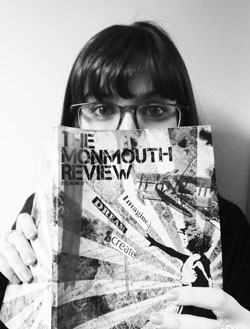There was an odd sight on campus last week. Some guessed it looked like a train, and other students walked by perplexed. A cattle car was parked outside of the Ocean First Bank Center, an exact replica of the very same ones used to transport Jews and other targeted groups in World War II during the Holocaust to concentration and extermination camps.
The Chabad Club of Monmouth University helped organize this exhibit, a partnership between Shadow Light and Southern NCSY, who both have strong values of holocaust education among youth. B’nai Sholom/Beth El Foundation provided the funding for the Hate Ends Now tour to come to Monmouth County.
Rabbi Yaakov Greenberg, Adjunct professor in the History and Anthropology department and Chabad Club Advisor said, “When I heard the Shadow Light Cattle Car Tour was coming to New Jersey I said, ‘what an amazing opportunity, we have to bring this to our campus!’ And I’m so glad we did. The feedback we have received from the students and faculty was inspiring. History is there to teach us, and I believe no student that walked out of the car wasn’t impacted.”
The “Cattle Car: Stepping in and out of Darkness” allows students to feel the immense reality of the Holocaust through physically being in the same space where many once stood. The traveling exhibit features multimedia projections to create an immersive experience with harrowing accounts from survivors. Survivors’ stories echo through the cattle car while live reenactments play over the walls, emphasizing the tight space, long journey, and uncomfortable conditions.
The voice of Holocaust survivor, Nate Leipciger, is one of the first voices heard throughout the car from the projector. He says, “Now you are here. A prisoner, no trial, no sentence, you’re condemned to death just because you are Jewish. The box car plays heavily in my mind because that’s the transition from being a human being to becoming a number of which they could dispose of at their own will.” In the Cattle Car, students learn that the Jews and other groups were stripped away of basic human needs with no privacy, one shared bucket for the bathroom, no food or water, and no proper ventilation, for an average of four days. Many perished in the very cars that were transporting them to their impending death and torture. Along the walls, students saw Nazi propaganda posters that perpetuated the hate by presenting Jews as the enemy.
The Nazis murdered six million Jews and at least five million prisoners of war, Romany, Jehovah’s Witnesses, homosexuals, and other groups according to The National WWll Museum. As years go by, there are fewer and fewer survivors alive and even less willing to travel and speak about their traumatic and life-altering experiences. Exhibits such as The Cattle Car enable students from around the world to be able to become educated on the atrocities of history by survivors themselves, even long after they are gone. It enables students to learn from history and helps them become a more accepting and kinder generation.
Sophia Sabbagh, a first-year biology student, shared her thoughts about the experience, “What impacted me most was to see the pictures and numbers of those who passed and were starving and killed solely based on their religion, ethnicity, or sexuality. I believe it’s absolutely important for college students to learn about the holocaust in order to spread awareness, to prevent future genocides, and to make the next generation of leaders less hateful than the previous ones.”
John Buzza, Senior Specialist Professor in the Department of Management and Leadership, brought his class to the exhibit once he heard it was on campus. Professor Buzza said, “Hate and prejudice is something that unfortunately is part of today’s society on all levels. The most important message to all Monmouth students that will manage others in the future is that you can see first-hand through the ‘Hate Ends Now’ exhibit, how this mentality can end up if not addressed now in our society. The injustice to humanity should be a lesson to all of us not to judge people on their race, religion, color, etc…”
After students exited the exhibit, they were asked to write down their own thoughts on a canvas outside the exhibit titled “How will you make your mark?” Many students wrote: I will speak up, set an example for others, spread awareness, by not hiding who I am, being proud of my Jewishness, and by not ignoring hate and prejudices.
When Eleanor Parks-Orr, a first-year biology student first came out of the exhibit, she said, “I felt a little overwhelmed. I knew going into it that I would be, but it blows me away every time. It was an intense and necessary experience, I want to learn more, I wish the exhibit was even longer.”
Holocaust education is more important now than ever with antisemitism and other hate crimes on the rise. According to research done by the Anti-Defamation League, which tracks anti-Semitic behavior nationwide, it was found that in 2021 antisemitic incidents hit a record high with 2,717 incidents reported in 2021, an increase of 34 percent from 2020. The states with the highest incidents reported: New York (416), New Jersey (370), California (367), and Florida (190).
Through educational experiences such as “The Hate Ends Now: Stepping in and out of darkness” exhibit, the next generation can be aware of what happens when hate is spread and accepted. Shadow Light’s mission of connecting students to the Holocaust on an emotional level hope to inspire students to make a positive impact on the world with a sense of responsibility and empowerment.



